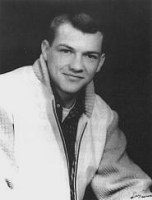07.) Morse Code * Don Woody * MCA Rockabillies
 Don Woody is not anyone about which you should necessarily know, and even his place in the Rockabilly Hall of Fame is more as a footnote than as a true heavy hitter in the story Rock & Roll. But his song “Morse Code” is not only entirely relevant to the conversation at hand, but is a good example of how many lesser known figures are also movers and shakers behind the scenes. Don was a support act for Red Foley, and Brenda Lee recorded a version of one of this tunes. Don’s backing band was none other than the Slewfoot Five, known for working with country legend Grady Martin (who popularized “The Lord Knows I’m Drinking,” among other things). But outside of his six or so songs released on Decca & Arco Records as cheap 45s, Don Woody’s career never broke into the national consciousness, and even in these MCA Rockabillies collections, he’s still more footnote than star.
Don Woody is not anyone about which you should necessarily know, and even his place in the Rockabilly Hall of Fame is more as a footnote than as a true heavy hitter in the story Rock & Roll. But his song “Morse Code” is not only entirely relevant to the conversation at hand, but is a good example of how many lesser known figures are also movers and shakers behind the scenes. Don was a support act for Red Foley, and Brenda Lee recorded a version of one of this tunes. Don’s backing band was none other than the Slewfoot Five, known for working with country legend Grady Martin (who popularized “The Lord Knows I’m Drinking,” among other things). But outside of his six or so songs released on Decca & Arco Records as cheap 45s, Don Woody’s career never broke into the national consciousness, and even in these MCA Rockabillies collections, he’s still more footnote than star.
People like this are often forgotten entirely if it weren’t for hardcore fans preserving music for future generations, and this series on Norton Records (picking up where Big Tone Records left off) deals with those forgotten gems and lost treasures that are not talked about much by modern fans. Music, like mythology, is dependent on the stories the culture is telling at any given moment, and while Don Woody’s tale – if there was ever much of one to tell – probably mirrors that of 100s of has-been artists who have put their hair up with pomade and tried to write a love song or two. The big difference here is that Don’s music, like all the artists featured on the MCA Rockabillies series, is as good, if not better, than anything that qualifies as well known from the same era.
A travesty? Maybe. If we knew enough about Don we could speculate more about what might have led to this minor god never gaining a reputation to make that of Hercules. Don’s career flamed out before the ’60’s really began, and maybe it was better that he took a shot and retreated to a simple down-home life, rather than become front page news when there’s nothing much worth reporting. His is certainly a more common story, and one that everyone can relate to to better than that of Carl Perkins, or Johnny Cash.
Don fell in love. Don wrote some songs about it. He made a small name for himself, and then went home to BE in love, on his own terms, and not just for his own sake.
How many of us can say that?